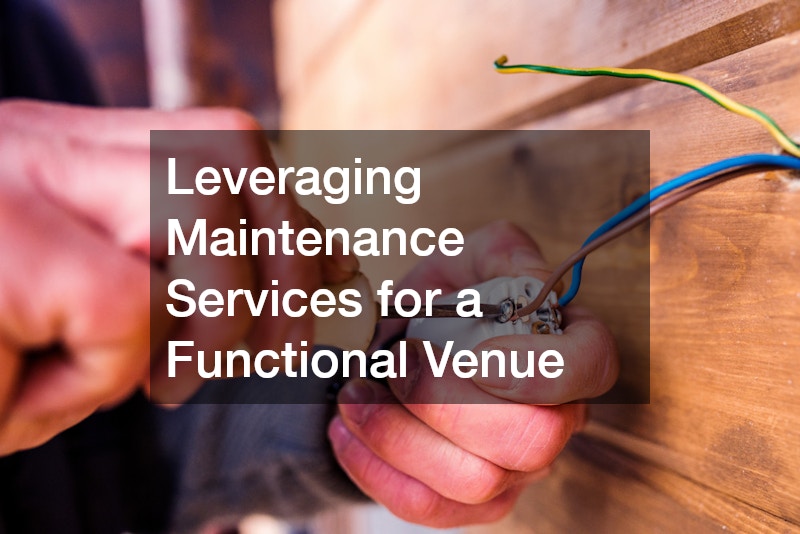
Local community theatre productions are more than just entertainment—they’re a cultural cornerstone, a source of local pride, and a platform for creativity, education, and expression. These productions bring together people of all ages and backgrounds to tell compelling stories, explore emotions, and foster collaboration. However, even the most passionate and talented performers need the right support to bring a production to life. That’s where local services step in.
When we think about what makes a successful theatre production, elements like lighting, sound, set design, costumes, and marketing often come to mind. But behind each of those components is a network of community partners—businesses and service providers whose contributions are invaluable. The truth is, your local community theatre doesn’t operate in a vacuum. It thrives when it’s interconnected with local resources.
In this blog, we’ll explore 12 local services that can elevate your local community theatre productions. From electricians who keep the lights on, to sign shops that create eye-catching promotional materials, these businesses play a critical role in transforming a simple stage into an unforgettable performance space. Each section will highlight one such service, integrating it seamlessly into the theatre world and explaining how you can build relationships with these partners to benefit both your theatre and your community.
Whether you’re a director, producer, actor, or volunteer, understanding how to tap into local expertise can be the key to raising the quality of your shows. Let’s dive into how these services can enhance your local community theatre and why partnering with them is a win for everyone involved.
1. Partnering with a Restaurant for Promotion and Support

A local restaurant can be a valuable partner for any local community theatre production. These businesses are often eager to support local arts and culture, especially when it gives them an opportunity for visibility and community engagement. Restaurants can host opening night parties, sponsor programs, or even offer discounts to ticket holders.
Collaboration doesn’t stop there. Cast and crew frequently need meals during rehearsals and show weekends. A nearby local restaurant can provide catering or quick, budget-friendly meals, which can help keep morale high and energy up. Themed menu items tied to the production can also draw attention and create buzz in the community.
The mutual benefits are clear: the theatre gains a consistent food source and promotional partner, while the restaurant enjoys increased traffic and goodwill. Hosting fundraising dinners, theatre-themed trivia nights, or community meet-and-greets are just a few creative ways to bring the two worlds together.
Incorporating a local restaurant into your production’s ecosystem not only helps logistically but strengthens the relationship between the theatre and the broader community—truly elevating the reach and impact of local community theatre.
2. Utilizing Safe and Effective Lighting Design
Every local community theatre production depends on effective lighting to bring stories to life. Whether it’s mood lighting for a dramatic scene or bright stage lights for a musical number, lighting can make or break a performance. That’s why partnering with skilled electricians is essential.
Electricians can assist with installing and maintaining lighting systems, ensuring everything is safe, up to code, and optimally functioning. Their expertise ensures that power sources are managed properly, cables are safely routed, and lights are correctly positioned for maximum effect.
In addition to safety and performance, working with local electricians supports your community’s economy. They may also be able to offer solutions that are energy-efficient and cost-effective, which is ideal for budget-conscious productions.
By involving electricians from the start of your planning process, you can collaborate on a setup that accommodates your specific stage layout and performance needs. Their technical advice and hands-on assistance help transform a simple stage into a dynamic space, proving once again how critical local expertise is to the success of local community theatre.
3. Collaborating with Engineers for Set Construction
Large-scale sets can add dramatic flair to a production, but they must also be safe. That’s where structural engineers come in. These professionals ensure that your elaborate set designs meet structural standards and can safely support performers, props, and equipment.
Especially in productions that require multi-level stages, moving platforms, or heavy set pieces, having a structural engineer assess and assist in the design is critical. They can collaborate with set designers to maintain the creative vision while ensuring everything is built to last.
Hiring a local structural engineer also builds relationships within the community. These professionals may be interested in contributing their skills to support the arts or even volunteering their time for nonprofit productions.
Safety is non-negotiable in any production, and incorporating a structural engineer helps mitigate risks. Their involvement protects your cast and crew while elevating the professionalism of your local community theatre. It’s a vital investment that ensures creativity doesn’t come at the cost of safety.
4. Leveraging Maintenance Services for a Functional Venue

Maintaining a clean, safe, and accessible theatre venue is vital to the success of any local community theatre. That’s why collaborating with a reliable property maintenance service is so beneficial. From landscaping and general repairs to plumbing and electrical upkeep, these professionals ensure your theatre stays in tip-top shape.
A well-maintained venue improves audience experience and demonstrates a level of professionalism that encourages repeat attendance. It also makes a big difference for cast and crew members who spend long hours rehearsing in the space.
If your theatre owns or leases its venue, establishing a recurring partnership with a property maintenance service is an efficient way to handle seasonal upkeep and emergency repairs. Many of these businesses are open to community collaboration, especially if they get public acknowledgment in playbills or programs.
By integrating property maintenance services into your theatre’s ongoing operations, you ensure your venue remains inviting and functional—key components in delivering top-tier local community theatre experiences.
5. Using Storage to Safeguard Costumes and Sets
Space is always at a premium for local community theatre groups. Costumes, props, and set pieces take up a lot of room, and not every theatre has the luxury of dedicated storage areas. That’s where a local storage unit becomes a crucial asset.
A climate-controlled storage unit helps preserve costumes and fragile set materials from damage due to humidity, pests, or temperature changes. It also allows for better organization between shows, making it easier to access and repurpose materials for future productions.
Having a relationship with a local storage unit provider can also offer flexibility in terms of contract length or special rates for nonprofits. This partnership can help the theatre avoid the clutter and chaos that often comes with limited backstage space.
Ultimately, a well-managed off-site storage solution contributes to the efficiency and sustainability of your productions, supporting the long-term growth of your local community theatre.
6. Tapping into Stores for Set-Building Supplies
Set construction is one of the most hands-on aspects of any local community theatre production. Whether you’re building a Victorian parlor or a sci-fi spaceship, the materials come from somewhere—and more often than not, it’s the local hardware store.
These stores are treasure troves for lumber, fasteners, paint, tools, and all the little details that bring a set to life. Building a strong relationship with local hardware stores can lead to discounts, donations, or even store-sponsored building days where employees volunteer their time.
The convenience of nearby hardware stores also speeds up the production process. Instead of waiting on deliveries or driving out of town, your crew can get what they need quickly and return to building.
By sourcing your materials locally, you also invest in your community’s economy. And when these stores see the tangible results of their contributions—a full house and a standing ovation—they’re often more than willing to continue their support.
This synergy is another great example of how local services enhance the quality and reach of local community theatre.
7. Working with a Local for Posters and Promotions

Marketing is essential to any local community theatre production. You could have the most talented cast in town, but without an audience, the performance falls flat. That’s why your local sign shop is a crucial partner.
Sign shops create eye-catching posters, banners, window decals, and other promotional materials that help raise awareness about your shows. Their professional-grade prints and designs ensure your materials stand out—whether they’re displayed downtown, in schools, or in local businesses.
By partnering with a local sign shop, you also tap into their knowledge of print design and local advertising trends. They can help you decide on the right size, style, and material for your signage to ensure maximum impact.
These collaborations often lead to ongoing relationships, with the sign shop potentially offering discounts or priority services for future productions. When you work with a local provider, your promotional efforts are not only more effective—they’re also a direct investment back into the community that supports your local community theatre.
8. Furnishing the Green Room from Dealers
The green room is a haven for actors—a place to relax, prepare, and regroup between scenes. Making it a comfortable and functional space can have a big impact on cast morale and performance. Partnering with local furniture dealers is an excellent way to upgrade your backstage environment.
Whether it’s couches, chairs, end tables, or mirrors, local dealers often have surplus or discounted items that they’re willing to donate or loan. In return, they gain exposure in your programs and recognition for supporting the arts.
In some cases, dealers may even offer custom pieces tailored to your needs or help design a cohesive look for backstage areas. These relationships also allow you to refresh your space periodically, keeping things clean and updated.
By working with local furniture dealers, your theatre not only gains access to quality furnishings but also forges ties with community-minded businesses. It’s another strategic way to elevate the behind-the-scenes experience in your local community theatre.
9. Keeping the Venue Spotless with Cleaning Services
Cleanliness is an important yet often overlooked aspect of running a successful local community theatre. Between rehearsals, performances, and special events, venues can quickly become messy and disorganized. That’s why working with professional house cleaning services is such a smart move.
These teams can handle everything from restroom sanitation to dusting, vacuuming, and trash removal. A clean venue creates a more welcoming environment for audiences and makes a big difference in the overall professionalism of your production.
House cleaning services are especially helpful between performance nights or after closing weekend, allowing your volunteers and staff to focus on creative tasks rather than deep cleaning. Regular cleanings also extend the lifespan of your venue’s furnishings and equipment.
Partnering with these services ensures that your local community theatre remains a place people are excited to visit—again and again.
10. Boosting Backstage Efficiency with Supplies

The backstage area is a whirlwind of activity before and during performances. To keep things running smoothly, your team needs access to reliable tools and materials. That’s where contractor supplies come in.
From gaffer tape to power tools, contractor supply companies offer the essentials that theatre crews rely on. Building a partnership with a local provider can yield discounts, donations, or quick access to needed items when you’re in a time crunch.
These suppliers understand the demands of fast-paced work environments, and many are eager to support community-based projects. By establishing a rapport, your local community theatre gains a dependable resource that helps solve problems quickly and efficiently.
Incorporating contractor supplies into your toolkit empowers your backstage crew, ensuring they have what they need to deliver seamless performances night after night.
11. Building Audience Comfort with Local Services
Audience comfort can make or break a theatre experience. If the venue is too hot, too cold, or poorly ventilated, it can distract from the performance and discourage future attendance. This makes HVAC services an important ally in maintaining quality local community theatre.
While this section doesn’t feature a client keyword, it plays an essential role. Regular HVAC maintenance ensures consistent climate control, helping keep both cast and audience members comfortable regardless of the season. It also protects sensitive equipment and costumes from humidity damage.
Collaborating with HVAC professionals keeps your venue running smoothly and shows that your theatre prioritizes audience experience. Reliable temperature control is another mark of a theatre that takes its productions—and patrons—seriously.
12. Maximizing Potential Through Partnerships
As we’ve seen, the success of your local community theatre doesn’t rely solely on talent or ticket sales—it hinges on a network of supportive local services. By forging partnerships with businesses like local restaurants, electricians, structural engineers, and more, you build a sustainable model that benefits everyone involved.
Each partnership adds value to your productions. Whether it’s through promotional support, safety assurance, storage solutions, or improved venue maintenance, local service providers can lift your theatre to new heights. Their contributions make it possible to stage more ambitious shows, attract larger audiences, and create a lasting impression.
More importantly, these collaborations deepen the ties between your theatre and the community. Audiences are more likely to support productions that reflect a cooperative, community-minded spirit. Service providers benefit from increased visibility and goodwill. The result is a thriving ecosystem where creativity and commerce coexist.
By investing in relationships with these 12 local services, you’re not just producing better shows—you’re fostering a vibrant, interconnected community where local community theatre is celebrated, supported, and sustained.
Local community theatre is about far more than the final curtain call. It’s about building connections, inspiring creativity, and fostering a strong sense of place. When we look beyond the spotlight, we see a whole network of local businesses and services working behind the scenes to make these productions shine.
These partnerships are not one-sided. The businesses involved gain exposure, community appreciation, and the satisfaction of contributing to something meaningful.As we’ve explored, there are at least 12 essential ways local services can enhance your local community theatre. By engaging with these providers, you not only boost the quality and safety of your productions but also embed your theatre more deeply into the life of your town or city. This interconnectedness ensures your theatre remains resilient, relevant, and rooted in community values.
So the next time you’re planning a season or prepping for opening night, take a moment to reach out to local partners. Their involvement might just be the element that turns a good production into a great one—and transforms your local community theatre into a true community treasure.



